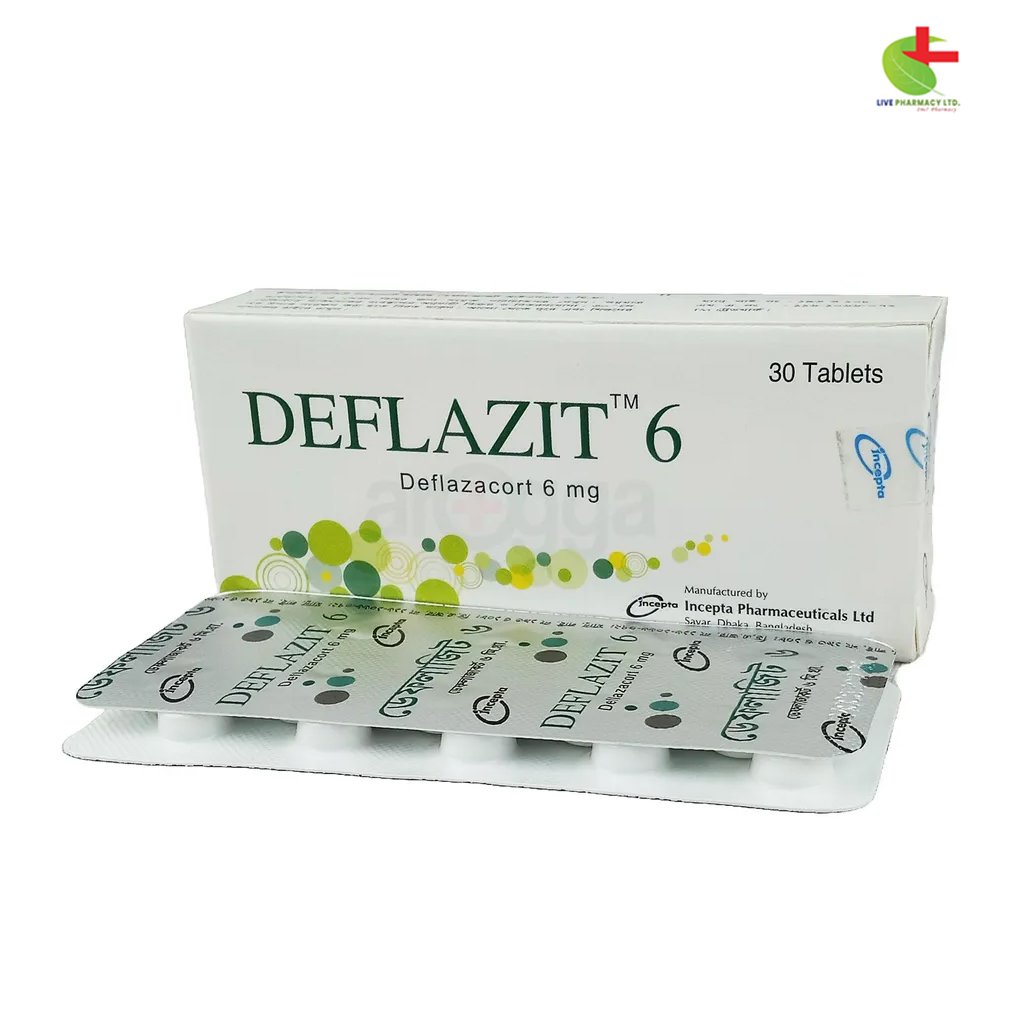Deflazit 6
95.00৳
- Deflazit is a glucocorticoid medication indicated for conditions such as anaphylaxis, asthma, rheumatoid arthritis, and autoimmune disorders.
- It provides anti-inflammatory and immunosuppressive effects by inhibiting the Phospholipase A2 enzyme.
- Dosing varies based on the condition, with careful monitoring recommended for children and patients with existing health issues.
- Always consult a healthcare professional for proper usage and guidance.
Indications
Deflazit is prescribed for:
- Anaphylaxis, asthma, and severe hypersensitivity reactions
- Rheumatoid arthritis, juvenile chronic arthritis, and polymyalgia rheumatica
- Systemic lupus erythematosus, dermatomyositis, mixed connective tissue disease (excluding systemic sclerosis), polyarteritis nodosa, and sarcoidosis
- Pemphigus, bullous pemphigoid, and pyoderma gangrenosum
- Minimal change nephrotic syndrome and acute interstitial nephritis
- Rheumatic carditis
- Ulcerative colitis and Crohn’s disease
- Uveitis and optic neuritis
- Autoimmune hemolytic anemia and idiopathic thrombocytopenic purpura
- Acute and lymphatic leukemia, malignant lymphoma, and multiple myeloma
- Immune suppression in transplantation
Consult a registered healthcare professional before using this medication.
Pharmacology
Deflazacort exhibits anti-inflammatory properties by inhibiting the enzyme Phospholipase A2, which is vital for prostaglandin synthesis. Additionally, it reduces the release of specific immune system chemicals, thereby providing immunosuppressive effects.
Dosage & Administration
Adults:
- For acute conditions, an initial dose of up to 120 mg/day may be necessary. Maintenance doses typically range from 3-18 mg/day.
- Rheumatoid arthritis: Maintenance doses are generally within 3-18 mg/day, using the smallest effective dose.
- Bronchial asthma: During an acute attack, high doses of 48-72 mg/day may be required, tapering down once controlled. For chronic asthma, doses should be adjusted to the lowest effective amount.
- Other conditions: Dosages depend on clinical needs, starting from a ratio of 5 mg of prednisone or prednisolone to 6 mg of Deflazacort.
Children: Due to limited clinical trial exposure, it’s crucial to use the lowest effective dosage. Typical doses range from 0.25-1.5 mg/kg/day, depending on the condition.
- Juvenile chronic arthritis: Maintenance dose of 0.25-1.0 mg/kg/day.
- Nephrotic syndrome: Initial dose of 1.5 mg/kg/day, followed by adjustments as needed.
- Bronchial asthma: Initial dose of 0.25-1.0 mg/kg on alternate days.
Withdrawal: For patients on high doses of systemic corticosteroids (approximately 9 mg/day or equivalent) for over three weeks, gradual dose reduction is essential to avoid relapse.
Consult a registered healthcare professional before using this medication.
Interactions
Deflazit is metabolized in the liver. If co-administered with liver enzyme inducers (e.g., rifampicin, carbamazepine), consider increasing the maintenance dose. Conversely, liver enzyme inhibitors (e.g., ketoconazole) may allow for a dose reduction.
Contraindications
Deflazacort is contraindicated in individuals with hypersensitivity to the drug or its components and in patients receiving live virus vaccinations.
Side Effects
Potential side effects of Deflazit include gastrointestinal disturbances, musculoskeletal issues, endocrine changes, neuropsychiatric effects, ophthalmic issues, fluid and electrolyte imbalances, increased infection susceptibility, impaired healing, skin atrophy, striae, telangiectasia, acne, myocardial rupture post-myocardial infarction, and thromboembolism.
Pregnancy & Lactation
Pregnancy: Deflazacort crosses the placenta and prolonged use during pregnancy may increase the risk of intrauterine growth retardation. It should only be used if the benefits outweigh the risks.
Nursing Mothers: Corticosteroids are excreted in breast milk, but doses up to 50 mg daily are unlikely to cause significant effects in infants. Higher doses may lead to adrenal suppression, though the benefits of breastfeeding generally outweigh theoretical risks.
Precautions & Warnings
Clinical conditions requiring special monitoring include:
- Cardiac disease or congestive heart failure, hypertension, and thromboembolic disorders
- Gastritis, diverticulitis, ulcerative colitis, and peptic ulcers
- Diabetes mellitus, osteoporosis, myasthenia gravis, and renal insufficiency
- Emotional instability, epilepsy, previous corticosteroid-induced myopathy, liver failure, and ocular herpes simplex
Use in Special Populations:
- Hepatic Impairment: Monitor and adjust doses carefully.
- Renal Impairment: No additional precautions needed.
- Elderly: Standard precautions apply, as common side effects may have more severe consequences.
Therapeutic Class
Glucocorticoids
Storage Conditions
Store in a cool, dry place below 25°C, away from light and moisture. Keep out of reach of children.












Reviews
There are no reviews yet.